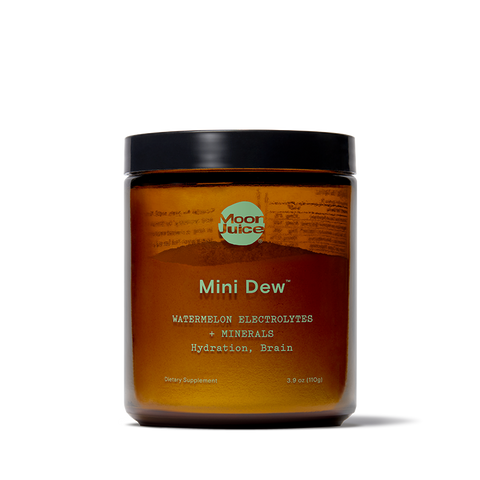Your body needs energy to survive and fuel day-to-day processes. Protein, fat, carbohydrates, vitamins, and earth-sourced minerals do the heavy lifting. But lesser-known trace minerals also play a role in promoting overall well-being, from helping inflammation to supporting optimal immune function and beyond.
What are trace minerals? These essential nutrients don’t typically show up on nutrition labels, but they’re critical to physical and mental health.
Below, we dive into the details of essential trace elements, including their benefits, the different types, and how to supply your body with the right ones to keep feeling good.
What Are Trace Minerals?
Trace minerals are essential minerals that your body needs — just in smaller amounts than other nutrients.
You typically get these minerals through diet since your body can’t produce them on its own, however, many people still have a mineral deficiency.
Benefits of Trace Minerals
Your body needs trace minerals to function, but only in small quantities. Typical trace mineral requirements are between 1 and 100 mg a day for adults --- or less than 1 microgram per day for ultra-trace minerals.
But just because you need lesser quantities of trace minerals compared to major minerals doesn’t mean they’re less important.
Trace minerals play a crucial role in many biochemical reactions inside your body, supporting immune function, energy production, cell function, and metabolism.
Here's how these trace elements support your body processes:
- Like macro minerals, trace minerals are essential building blocks for enzymes that are involved in energy production, metabolism, nerve signal transmission,
- DNA synthesis, and tissue creation.
- Many act as antioxidants, helping prevent oxidative stress resulting from free radicals
- Some trace minerals help regulate insulin and blood glucose levels
- Trace minerals like Zinc play an important role in keeping your immune system strong and healthy, aiding in reproductive health, too.
- Certain micro-minerals also influence your body's hormone production.
Types of Trace Minerals
What types of trace minerals does your body need?
Below, we outline examples of trace minerals, why they’re important for overall health, and how much you need of each on a daily basis.
Iron
Your body uses Iron to propel growth and hormone production. Without enough of it, you can develop iron deficiency anemia, which causes pale skin, extreme fatigue, weakness, and hair loss.
The daily recommended amounts for Iron are:
- For adult males: 8 mg
- For adult females: 18 mg
- Older adults (51+): 8 mg
- Pregnant females: 27 mg
Zinc
Zinc is also essential for growth and helps support immune health, wound healing, and cell division.
One 2022 review of studies suggests that taking a Zinc dietary supplement may help prevent health issues like pneumonia in children. In adults, Zinc may play a role in mood regulation and male reproductive health.
The daily recommended amounts for Iron are:
- For adult males: 11 mg
- For adult females: 8 mg
- For pregnant females: 11 mg
- For people breastfeeding: 12 mg
Copper
You need trace amounts of Copper to maintain healthy connective tissues and blood vessels. Copper is also important for immune and nervous system health.
The results of one questionnaire-based study involving over 14,000 respondents found that a median intake of 1.0825 milligrams (mg) of Copper daily was linked with lower heart attack risk in smokers, older women, and people with diabetes and high blood pressure.
The daily recommended amounts for Copper are:
- For adults: 900 micrograms (mcg)
- For pregnant females: 1,000 mcg
- For people breastfeeding: 1,300 mg
Manganese
This trace mineral helps your body metabolize amino acids, the essential building blocks of proteins. Manganese may also aid cholesterol and carbohydrate metabolism.
According to a 2020 study that reviewed the 2011-2016 National Health and Nutrition Examination Survey results, Manganese may help regulate blood sugar levels and support healthy kidney function.
There’s no official estimated average requirement for Manganese, but most people get enough of this essential trace mineral through diet.
Iodine
Data cited in a 2022 review suggests that about 35-45% of the global population has an Iodine deficiency.
Without enough Iodine, your thyroid can’t effectively regulate thyroid hormone levels, making this trace mineral crucial for thyroid function.
The daily recommended amounts for Iodine are:
- For adult males: 150 mcg
- For adult females: 150 mcg
- For pregnant females: 220 mcg
- For people breastfeeding: 290 mcg
Selenium
Selenium also plays a role in maintaining healthy thyroid hormone levels. And it helps protect you from oxidative damage and infection.
The daily recommended amounts for Selenium are:
- For adult males: 55 mcg
- For adult females: 55 mcg
- For pregnant females: 60 mcg
- For people breastfeeding: 70 mcg
Chromium
This lesser-known trace mineral may play a role in helping your body metabolize macronutrients. There’s also evidence that it has antioxidant properties.
There’s some debate over whether it’s an essential trace mineral. And since most people can easily get Chromium by following a regular diet with mineral-rich foods, there’s no official daily recommended value.
Cobalt
Cobalt is important for red blood cell formation and nervous system health and is a part of Vitamin B12.
There’s currently no recommended daily value for Cobalt. But, if you’re deficient in Cobalt, you’re also deficient in Vitamin B12, which can cause anemia symptoms like extreme tiredness and nerve damage.
Evidence suggests this trace mineral may help the body metabolize fatty acids. One small 2018 study involving 24 males found that 5 mg of ionized Cobalt daily for 3 weeks helped improve red blood cell concentration, leading to better athletic endurance.

How to Get Trace Minerals
Because you only need small amounts of trace minerals like Iron and Zinc, your diet alone can likely sustain your trace mineral needs.
That said, some people have a higher need for certain nutrients — trace minerals included. If you’re pregnant, breastfeeding, or doing intense running or lifting, your body may need more trace minerals than your diet can provide, especially Iron.
Plus, today’s food may contain fewer nutrients than it once did. Nutritional profiles of crops have changed over time with the introduction of monocropping and synthetic fertilizers. That means your diet might not be able to keep up with your body’s nutrient demands, especially when it comes to micronutrients.
Some trace mineral deficiencies are more common than others. Iron deficiency, for example, is common worldwide, particularly in females. An Iodine deficiency is also common, especially in areas with low soil Iodine levels.
So, what’s the solution for a trace mineral-starved body?
Electrolyte Supplement With Trace Minerals
A daily mineral supplement can help boost your trace mineral stores and keep your body powered.
You can replenish your mineral stores with Mini Dew™. Our 2 in 1: electrolyte powder comes in two flavors (watermelon and pomelo) and is formulated with:
- A microplastic-free pink salt to support water balance around cells.
- Ionic trace minerals to give the body the elements it needs to stay energized.
- Chelated essential minerals to help with cognitive performance and limit brain fog.
The Takeaway
Trace minerals or micronutrients are just as important for your overall physical and mental well-being as macronutrients. They’re necessary for cognitive function, hormone balance, restorative sleep, skin and hair health, gut health, and immune function.
Even though your body needs only small amounts of micronutrients, it’s possible to be deficient in several essential trace minerals.
You can take an active approach to fueling your body with the trace minerals it needs to be well by eating a well-rounded, whole-food diet full of mineral-rich foods.
A trace mineral supplement can also help you cover your micronutrient bases.
Looking to add minerals to water quickly? Our easy-to-use electrolyte powder instantly dissolves in water and provides a dose of trace minerals when you need it — after a tough workout, a hot yoga session, or while on the go for work or leisure.
Sources
- Anemia in women and children. (2021). https://www.who.int/data/gho/data/themes/topics/anaemia_in_women_and_children
- Chromium. (2022). https://ods.od.nih.gov/factsheets/Chromium-HealthProfessional/
- Cobalt. (n.d.). https://www.urmc.rochester.edu/encyclopedia/content.aspx?contenttypeid=19&contentid=cobalt
- Copper. (2022). https://ods.od.nih.gov/factsheets/Copper-Consumer/
- Daily value on the nutrition and supplement facts labels. (20230. https://www.fda.gov/food/nutrition-facts-label/daily-value-nutrition-and-supplement-facts-labels
- Hatch-McChesney A, et al. (2022). Iodine and iodine deficiency: A comprehensive review of a re-emerging issue. https://www.ncbi.nlm.nih.gov/pmc/articles/PMC9459956/
- Hoffmeister T, et al. (2018). Effects of 3 weeks of oral low-dose cobalt on hemoglobin mass and aerobic performance. https://www.frontiersin.org/articles/10.3389/fphys.2018.01289/full
- Iodine. (2023). https://ods.od.nih.gov/factsheets/Iodine-HealthProfessional/
- Iron. (2023). https://ods.od.nih.gov/factsheets/Iron-Consumer/
- Iron-deficiency anemia. (n.d.). https://www.hematology.org/education/patients/anemia/iron-deficiency
- Li J, et al. (2022). Zinc intakes and health outcomes: An umbrella review. https://www.frontiersin.org/articles/10.3389/fnut.2022.798078/full
- Ma Y, et al. (2022). Advances of cobalt nanomaterials as anti-infectious agents, drug carriers, and immunomodulators for potential infectious disease treatment. https://www.ncbi.nlm.nih.gov/pmc/articles/PMC9696703/
- Manganese. (2021). https://ods.od.nih.gov/factsheets/Manganese-HealthProfessional/
- Selenium. (2021). https://ods.od.nih.gov/factsheets/Selenium-HealthProfessional/
- Tako E. (2019). Dietary trace minerals. https://www.ncbi.nlm.nih.gov/pmc/articles/PMC6893782
- USDA FoodData Central Database. (n.d.). https://fdc.nal.usda.gov/fdc-app.html
- Wen H, et al. (2022). Dietary copper intake and risk of myocardial infarction in US adults: A propensity score-matched analysis. https://www.frontiersin.org/articles/10.3389/fcvm.2022.942000/full
- Yang J, et al. (2020). Sex-specific associations of blood and urinary manganese levels with glucose leels, insulin resistance and kidney function in US adults: National health and nutrition examination survey 2011-2016. https://www.sciencedirect.com/science/article/abs/pii/S0045653520311334
- Zinc. (2022). https://ods.od.nih.gov/factsheets/Zinc-HealthProfessional/














